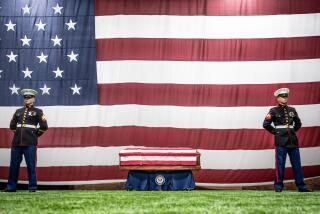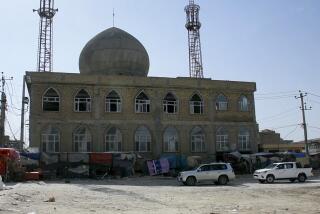Afghanistan roadside bombs kill at least 26
- Share via
KABUL, AFGHANISTAN — The pace of American combat deaths in Afghanistan has quickened anew as roadside bombs killed five U.S. troops in 24 hours in the same western province, the American military said Thursday.
The deaths bring to 11 the number of American troops killed in Afghanistan so far in August, on the heels of what was the worst month for Western and U.S. troop fatalities since the conflict began in 2001. Forty-three American military personnel died in July.
Violence has been surging in advance of Afghanistan’s presidential and provincial assembly elections, which are two weeks away. In addition to the troop fatalities, a total of 26 Afghans, most of them members of a wedding party, were reported killed in roadside bombings Thursday.
The U.S. deaths occurred in Farah province, bordering Iran, where a force consisting mainly of U.S. Marines staffs a string of small forward operating bases set deep in the desert. They are connected by a route American forces have been struggling for months to keep free of roadside bombs, which have made travel extremely dangerous for villagers and military convoys alike.
One of the fatalities occurred Wednesday, and the other four, in a single incident, came Thursday, the U.S. military said. Such “clusters” of fatalities are becoming less uncommon; three American soldiers were killed over the weekend in a roadside bombing in the south.
Some American field commanders have said that more insurgents may be moving into Farah in response to a major U.S.-led offensive in Helmand province, to the east, which began in early July. But insurgents had been tightening their grip on Farah even before the Helmand offensive.
Faced with a far stronger force of 4,000 Marines who have seized the lower Helmand River valley, insurgents have avoided a full-on battlefield confrontation, melting away into the countryside while redoubling their efforts to seed the roads with explosives.
The roadside bombings in Helmand on Thursday killed 21 members of a wedding party and five police officers, Afghan officials said. The wedding-party blast also injured at least five other people, said Helmand’s police chief, Asadullah Sherzad.
The roadside bomb that hit the wedding party was almost certainly aimed at coalition troops. A tractor carrying the party, which included women and children, set off the buried bomb on a road in Garmser district, which Western troops have repeatedly tried to clear of insurgents.
Marines occupied the district for much of last year and returned last month with the current offensive.
Elsewhere in Helmand, a vehicle carrying Afghan police officers struck a roadside bomb in Nad Ali district, another insurgent stronghold. Five officers were killed and three others injured, the Interior Ministry said in a statement.
Meanwhile, controversy erupted over allegations that a Western airstrike late Wednesday resulted in civilian deaths in Kandahar province, which borders Helmand.
The police chief in Zhari district said five farmers were killed as they loaded produce into a truck, preparing to take it to Kandahar city. The U.S. military, however, said it was believed the five were loading the truck with munitions.
Navy Lt. Cmdr. Christine Sidenstricker, a U.S. military spokeswoman, said the incident would be investigated, including a review of cockpit video from the Apache attack helicopter that carried out the strike.
Civilian casualties are a point of major tension between Western forces and Afghan officials. A United Nations report said noncombatant deaths rose nearly 25% in the first half of 2009, with about 60% of them blamed on insurgents and most of the remainder on coalition forces.
The North Atlantic Treaty Organization’s new secretary-general, Anders Fogh Rasmussen, on a visit to Afghanistan, said at a news conference Wednesday in Kabul, the capital, that the alliance would do everything in its power to avoid causing civilian casualties.
The new commander of American and Western forces, U.S. Army Gen. Stanley A. McChrystal, has also ordered field commanders to make safeguarding civilian lives their top priority.
--
More to Read
Sign up for Essential California
The most important California stories and recommendations in your inbox every morning.
You may occasionally receive promotional content from the Los Angeles Times.










